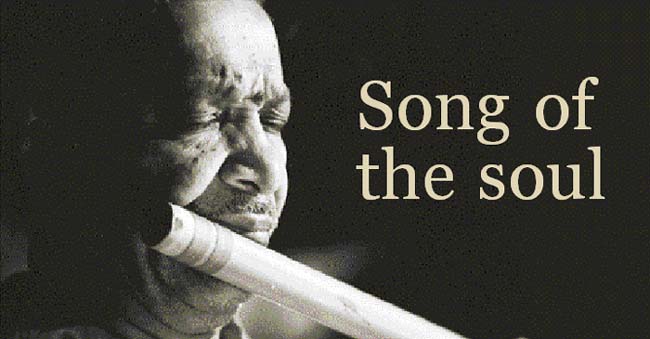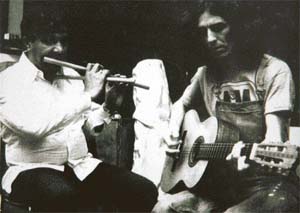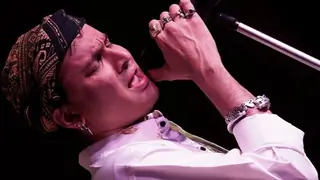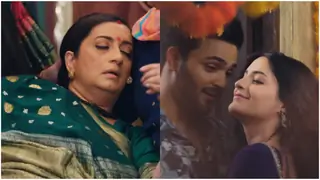This is available at http://www.tribuneindia.com/1998/98dec20/sunday/view.htm from a 1998 interview
"Folk music is the base of all music"
IT has been no bed of roses for flautist par excellence Hari Prasad Chaurasia who has turned 60 this year. From being an obscure, little known wrestler to scaling dizzy heights as the greatest exponent of the divine musical instrument, flute, the journey has been eventful. Today, Hari Prasad Chaurasia is a cult figure. His very name evokes awe and inspiration for many who vie for a place for themselves in classical music. Packed auditoria in India and elsewhere vouch for the mastery that he has attained in playing the flute, the instrument which is synonymous with Lord Krishna. Any mention of classical Hindustani music of the day will be incomplete without a mention about him.
If Shyam Benegal has produced a documentary, Hari Prasad Chaurasia, to felicitate he maestro on his turning 60, the well-known writer Uma Vasudev has come out with a book, Romancing the flute, which captures the life and work of Chaurasia. Fellow musician and vocalist Pandit Jasraj has composed a special number, Jeevat Sharadah Shatam, in honour of Chaurasia, while the sarod maestro Amjad Ali Khan has recorded a special composition in raag lalitadwani to mark Chaurasia's Shashtyabdipurti. His incomparable music has the ability to captivate the minds of the listeners.
Hari Prasad Chaurasia would have been lost forever for the realm of music had he pursued his career as a wrestler for which he was taking training. Something prompted the young boy of 15 to defy his father and enrol himself as a student of the renowned vocalist of the time, Pandit Rajaram from Banares. The real turning point came about in Chaurasia's career as a musician when he chanced to hear the flute recital of Pandit Bholanath, a well-known flautist of the time and a student of the legendary Pannalal Ghose. Then and there Chaurasia decided that he was going to be a flautist. He knew for certain that his guru could only be Pandit Bholanath!
The next five years saw young Chaurasia taking intensive training in flute under Pandit Bholanath. By the time he was 20, Hari Prasad Chaurasia had already achieved enough proficiency in flute to be enlisted as s staff artist in All India Radio and was posted in Cuttack. The next five years saw him playing frequently for the radio and performing occasionally on stage. The second turning point in life and career came about when he was transferred to the Mumbai station of the All India Radio.
While in Mumbai, he wanted to learn music from Annapurna Devi, daughter of Ustad Allaudin Khan of Maihar and younger sister of sarod maestro Ali Akbar Khan, who had settled down in Mumbai after her marriage to Pandit Ravi Shanker. It was his initiation under Annapurna Devi which transformed Pandit Hari Prasad Chaurasia from being an obscure radio artist to a cult figure in Hindustani music arena.
There was a perceptible change in the style and substance of his music after that. The flawless tonal excellence of his flute started showering intricate raag- aalap, with deftness and clarity. It took very little time for the connoisseurs of music to recognise the latent talent in the young flautist who could touch the nerves of hidden and unexplored territories in the realm of Hindustani classical music. Since then there has never been an occasion for Chaurasia to turn back with packed auditoriums and standing ovations having become synonymous with every concert of his, not only in India but all over the world. Awards and accolades began to pour in as if no award is worth its name without it being conferred on Chaurasia.
If he mesmerised the classical music audience with his flawless flute, the celluloid world did not lag behind in exploiting the unquestionable genius in his music. Director Yash Chopra opened up a new vista to Chaurasia when he invited him and the santoor maestro Pandit Shiv Kumar Sharma to score the music for his films. The Shiv-Hari combination proved extraordinarily successful, proving the sceptics, who expressed reservations about the ability of classical musicians to churn out titillating melodies on screen, wrong.
Hari Prasad Chaurasia, the flautist par excellence, continues to enchant the audience the world over with his flawless melody of the flute and has gone a step further in establishing a gurukul in Juhu to train budding flautist. He, probably, does not want talented young boys to be deprived of the opportunity to learn flute for want of the right guru. His own experience and the hurdles he faced in mastering the flute must have prompted him to embark upon such an experiment, which has so far produced half a dozen sishyas to keep the Chaurasia magic alive for posterity.
In this interview to Art Lover Jr. of Newscribe, the flute maestro delves in detail about the hardships he faced to reach where he is now and the challenges facing the classical music in the country. Excerpts:
What, in the first place, made you opt for flute instead of other popular stringed and percussion instruments?
The only inspiration for my attraction towards flute was that it happened to be Lord Krishna's favourite. Whenever I worshipped the idols of Radha and Krishna in our house, the flute in the hands of Lord Krishna used to attract me. I used to see pictures and idols of Lord Krishna holding a flute and as a lad I always wanted to hear him play it. That was probably my first inspiration.
Is it not a fact that you were originally trained to be a wrestler?
That is a fact. The dands and baithaks done by me as a lad are keeping me in good stead now, I suppose. The initial training probably helps me to keep my physique alright.
Was it a hard journey for you to make a mark as a flautist of repute?
Undoubtedly it was an uphill task. However a genius or talented a person might be, he cannot master an instrument unless backed by sound fundamentals and right training under a well-informed guru. If locating the guru is difficult, it is all the more difficult to convince that guru that you would be a worthy disciple who would keep his name alive. Only then the guru will be tempted to impart the knowledge and substance of his or her music to the sishya. When I look back I realise that I had to slog it out of reach where I am today.
What really contributed in the making Hari Prasad Chaurasia of today?
It was a process of evolution, I must confess. I cannot single out one particular thing and say that this was the reason for my evolution as a flautist. Right from my initiation under Pandit Rajaramji to learn vocal music, many things happened. My training under Pandit Bholanathji, my AIR days in Cuttack, training under Annapurna Deviji and even my experiments with cinema music have all contributed in making me what I am today.
Could you say something about your training under Annapurna Deviji?
Guruma Annapurna Devi was to hard a nut to crack. She was then married to Pandit Ravi Shankerji and was initially not interested in teaching me. In fact, I wanted to become a student of her father Ustad Allauddin Khan but my father, who was alive at that time, would not permit me to go to Maihar and become his sishya. I used to go to Ravi Shankerji's house every day with the same request but she never used to take it seriously. Finally, she agreed to teach me with the condition that I unlearn everything and learn music from scratch under her. By then, remember, I was already performing on stage. Even then, I accepted and she took me as a student after three years. The training under her did change the course of my life and influenced my music for all time to come. Guruma gave my music a new depth and dimension I had never known I was capable of.
What in your opinion makes the flute different from other musical instruments?
As I told you, it is a natural instrument. Unlike other more advanced instruments, where the note is sustained for a longer time through resonance and reverberation, in the flute the musical note is there only as long as you blow on it. The music and notes emanating from the flute are natural.It touches the heart and soul. Even animals are attracted towards it. What does it show? It all goes to prove that this was the original musical instrument of man much before the advent of any civilisation.
You had seniors, you have contemporaries and there are upcoming flautists too. What makes you different from them?
In music, it is wrong to make comparisons. Each one has his or her own style and every artiste has certain unique points which are absent in another artiste. I have great admiration for Pannalal Ghoseji's flute. His was the Khayal type. I play in Dhrupadia style. There is, of course, late T.R. Mahallngam of Carnatic music who was a prodigy. His was the Chanchal type. Each flautist has his strong points and a comparison is meaningless.
You have played jugalbhandhis with Carnatic music flautist N.Ramani. What difference do you find between the two branches of Indian classical music -- Hindustani and Carnatic?"
Carnatic music is mercurial in nature. It is much faster and gives lesser importance to aalap.Carnatic music lays more importance on the sahitya than on the aalap. Their music is based on the sahityas which are devotional and composed by great composers with a divine gift. But for this difference, the rest is more or less the same because both Hindustani and Carnatic music are based on the same sapthaswaras.
What prompted you to dabble in film music?
I don't see anything wrong in it. In fact, it gave me an opportunity to widen my horizon and get a better idea about orchestration. Yash Chopra being a classical musician himself, took the risk of offering me and Pandit Shiv Kumar Sharmaji an opportunity to compose music for commercial films. Starting from Silsila in 1980, we have composed music for a number of films that include Lamhe, Basera, Parampara and Chandni. Most of them have been hits too. I am happy to have broken the myth that classical musicians are unfit to score music for films. I wish somebody comes out with a film based on classical music so that we can put our best efforts to make it a popular hit through songs. It is being done periodically in the South, in Telugu and Malayalam. But in Hindi, such films are a rarity because no one is coming forward to take that risk
Do you set any standard for yourself when you compose music for films?
Producing a commercial film is one thing and commercialising the entire film-making is quite another. Cinema should be seen only as an entertainer, I agree. At the same time, it should also be a decent entertainer. In the songs of yesteryears, lyrics played an important role compelling the audience to hum the songs even months after they had heard them . Nowadays, lyrics have become so vulgar and sub-standard that one cannot sing the songs in front of others. We have made it a point not to compose music for songs with vulgar lyrics. That is our basic criterion while scoring music for a film.
It is said that you have a gurukul. How far has it been successful venture?
I do not take more than four students at a time. Money is not a criterion for imparting training. I have gone through a long and hard struggle. I don't want young people to suffer for want of institutional support. My gurukul in Juhu has been named "Vrindaban' and it is not a commercial school churning out a line of performers. The training provided there is limited to a few who are devoted to music. I don't demand fee from them. If I could be of help in developing the latent talent in any young artiste and make him a master in his own right, that will be the greatest reward I would ever get.












 THE little boy's father was the famed Chedi Lal Pehalwan, the wrestler. He wanted his three sons to be wrestlers like him. As a disciplined devotee he would sing the devotional hymns at the morning prayers. But that was far as music could go. No question of trying out the flute in front of him, thought Hari. But away from his father's watchful eye, away from the rituals at home and the school and the competitive yells of the wrestlings pit, he would sneak out whenever he could with his stolen flute. He would find a hidden corner and take delight in the few notes he could coerce out of the bamboo reed. In a family governed by a man obsessed with creating an ancestry of wrestlers, Hari realised that he dared not articulate his fascination with something as far removed and contrary as music. If his father felt that he harboured any ambitions other than to follow in his footsteps, Hari knew he would get a sound thrashing. His father packed a wrestler's punch.
THE little boy's father was the famed Chedi Lal Pehalwan, the wrestler. He wanted his three sons to be wrestlers like him. As a disciplined devotee he would sing the devotional hymns at the morning prayers. But that was far as music could go. No question of trying out the flute in front of him, thought Hari. But away from his father's watchful eye, away from the rituals at home and the school and the competitive yells of the wrestlings pit, he would sneak out whenever he could with his stolen flute. He would find a hidden corner and take delight in the few notes he could coerce out of the bamboo reed. In a family governed by a man obsessed with creating an ancestry of wrestlers, Hari realised that he dared not articulate his fascination with something as far removed and contrary as music. If his father felt that he harboured any ambitions other than to follow in his footsteps, Hari knew he would get a sound thrashing. His father packed a wrestler's punch.














